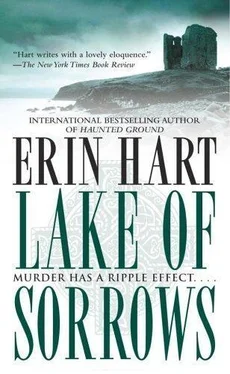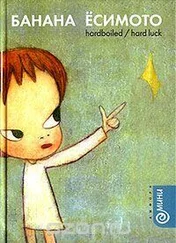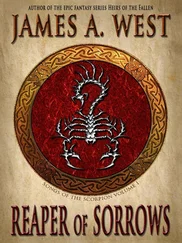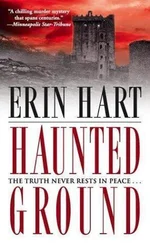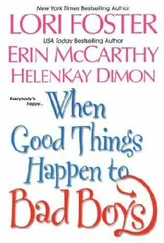He’d met Eithne at a spring wedding. One of his younger colleagues had taken the plunge. He remembered how the young sergeant and his friends had all slagged him as a perennial bachelor. Up to that point, he had never found anyone who had moved him enough—until the moment he’d glimpsed a wondrous creature playing a harp in the corner at the wedding dinner. He’d been struck at once by her sorrowful eyes, but above all by the dignity in her bearing, the graceful way she moved. She had seemed so regal, so self-contained, and he was a man who noticed such things.
He had been puzzled by the fact that he’d never seen this girl before, that he’d known nothing of her existence. He made a few discreet inquiries at the wedding party, and found she lived with her father and younger sister near Loughnabrone. She was considerably younger than he was—fourteen years—and astonished, embarrassed by his interest, her manner always somewhat diffident. He had not taken love easy, as the song implored, but uncharacteristically pursued her, wooed her, and eventually won her heart, although he sometimes wondered now whether she had finally consented to marriage more out of misplaced compassion than from genuine affection. At the time, it hadn’t mattered. He had never experienced anything like it, the hunger that seemed to occupy every cell of his body, a chemical fire that would not be calmed or cooled. His all-consuming need to be with her, to possess her, had seemed sufficient to carry them both. But of course it had not been sufficient.
He’d told no one that Eithne had been carrying their child when she’d walked into the river. It didn’t seem right to share a secret that had been revealed to him only through her death. She must have known about the child, and she had been so far sunk into confusion and despair that the prospect of a new life had not lifted that dark veil, but only made things worse. She had packed a bag before she’d walked down to the river that day, a single lucid gesture that had been calculated, he supposed, to save him the trouble of sorting through her things after she’d gone. He had opened the case and spilled the neatly folded skirts and blouses onto their bed, buried his face and wept into the silky underthings still suffused with her scent.
Lugh came through the bedroom door and stopped in front of him. The dog lifted his graying muzzle and sniffed the air, and Ward tried to reassure him with a friendly scratch. “It’s all right, auld son. Relax.” He felt great tenderness for his aging companion, who had arrived in this house as a tiny pup, a gift from his colleagues just after the first anniversary of Eithne’s death. They had been together a long time, he and Lugh, and he knew the dog wouldn’t last the year, if that. Lugh had come to the point in his existence where major systems had begun to break down, as they would for all creatures, Ward supposed, should they live so long. We are all vulnerable in that way, he thought—soft and imperfect, riddled with frailty. Long ago he’d forced himself to admit that he’d been drawn to Eithne Scully’s dangerous streak, as if she could make up for that part of him that was afraid to live intensely in the present. He’d been fascinated by the dark, chaotic side of her nature, capable of great passion and creativity, but also subject to fits of paranoia and an inconsolable desolation. He’d once thought that if he could only surround her with peace and constancy, she might be able to hold some fragment of it within her, but once again he had been wrong. A capacity for contentment was something they had never shared. Eithne was always restless, chafing at any and all expectations. When he’d first brought her to this house after they were married, she’d followed him around as if on a tour, then gone home to her father’s house for another fortnight before he’d convinced her to come back and live with him here.
In hindsight, of course, he felt he ought to have seen the signs earlier. At first, the changes had been gradual, imperceptible, mere hairline cracks. He’d taken to sorting through their lives, remembering gestures and looks, wondering about that certain blank expression that had said she didn’t know who he was or what she was doing here with him. Eventually she hadn’t been able to play the harp anymore; her hands would no longer do what she told them. He had arrived home one evening and found her sitting at her harp, with the instrument all unstrung, a web of golden wires across her lap. It wasn’t right, Liam, she’d said. I know I could play if only it were strung properly. The harp sat, still unstrung, in the corner of the sitting room.
One day she had told him she’d taken up walking. At first he’d been encouraged, hoping that a daily dose of physical activity might help lift her mood. But even that had taken a bad turn as time went on. Coming home, he’d sometimes overtake her on the roadside, walking with her head down, lips moving in some silent litany, weighed down with the burden of words and numbers that had begun to crowd her mind. Eventually she was counting exactly how many steps it took to get to every one of her regular stops around the town: the post office, the newsagent, the chemist. He found her pockets jammed with small items she’d taken: scarves, gloves, lipsticks—all things she didn’t use—which he would return discreetly. No one ever had the heart to confront her directly. Then she’d begun venturing farther afield. He remembered the terrible phone call from the Garda station in Ballingar, six miles away, where she’d turned up in the midst of a downpour, asleep at the foot of the Virgin in the grotto. She’d been completely disoriented when he came to fetch her, like a lost child. He still recalled her blank look when he’d tried asking what she had been doing wandering alone in the rain. She’d not ventured out for a few weeks after that episode, and he had thought she might be taking a turn for the better, not perceiving the nature of the disease that gripped her.
His colleagues had always treated her with deference and been discreet in their dealings with him, but it was a discretion born of pity rather than understanding. He knew what they said behind his back. “Poor auld Ward. You wouldn’t wish that mad wife of his on anyone.” She was slipping gradually into oblivion, and nothing he did could make things better. He lived each day in limbo, in dreadful anticipation. She shouldn’t have been left alone, and yet he knew she would have found some means to get away. There was no such thing as enough vigilance. And if he had allowed himself to admit it, a part of him wanted to let her go, to let her have what she so ardently wanted.
The final phone call had brought him to the river’s edge. Her body lay submerged in the clear water, and her long dark hair streamed away from her face, rippling in the current like the pale green weeds that trailed along beside her. The dress she wore under the raincoat billowed in the water. She had been so peaceful, so beautiful in death, suspended in her otherworldly, watery realm, that never-empty channel pouring itself endlessly into the sea. All at once he felt what she must have felt as the cold water closed over her—a relief that was almost like communion. But in his case, the feeling was brief and transitory. He remembered standing on the bridge as the ambulance men splashed into the shallow water to lift her out onto a stretcher, pale, cold, and heavy, once more subject to the earth’s dreadful gravity. Had he contributed to that gravity, become part of what she could no longer bear? He tried to tell himself that nothing he’d done or failed to do had made the final difference to her, but in the end, that was the saddest testament of all. He thought of her every day, was still tied to her, as he would be always, those river weeds firmly twined around his heart.
Читать дальше
